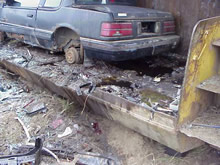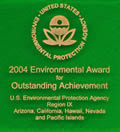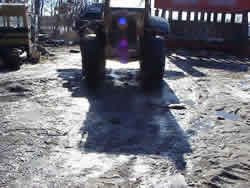Pacific Southwest, Region 9
Serving: Arizona, California, Hawaii, Nevada, Pacific Islands, Tribal Nations
Compliance assistance at work in auto salvage yards and auto recycling facilities
Recent compliance success: EPA settlement with auto recycler will reduce mercury pollution
National Information

Pick Your Part Auto Wrecking Co. will remove and recycle mercury in 60,000 switches from salvaged vehicles at its nine California yards in the first such project in the state. This project is showing the way for other salvage yards to comply with a California law requiring all auto dismantlers to remove mercury switches from scrapped vehicles starting in January 2005.
Within the United States, an estimated 10 tons of highly toxic mercury are released to the environment each year from mercury-containing light switches during the shredding and crushing of old vehicles. Pick Your Part’s environmental project, valued at $235,000 will prevent mercury from 60,000 switches from polluting the environment.
The project was part of the settlement reached after EPA fined Pick Your Part Auto Wrecking $165,000 for failing to carry out adequate stormwater management practices and pollution prevention plans, in violation of the Clean Water Act, at five auto wrecking and recycling yards in California.
State of California Auto Dismantlers Association
wins EPA environmental award for compliance assistance
program

The California Auto Dismantlers Association (SCADA) has created the “Partners in the Solution” program to ensure that member businesses adhere to strong environmental, safety, business and licensing standards. This innovative program raises the bar for the auto recycling industry, while providing the education and support needed to bring facilities into compliance with these standards. Nearly 200 auto recycling facilities currently participate in the program.
EPA supports industry efforts, like SCADA’s,
which assist their members in complying with the
complete range of environmental, safety and business
regulations. By law, auto dismantling facilities
must drain, manage, and dispose of toxic vehicle
fluids in an environmentally safe manner; dismantle
and clean the vehicles as specified in their permits;
cover engines and other auto parts; and develop
and carry out storm water pollution prevention
plans.
Recycling cars and trucks
Cars and trucks are the number one recycled product in America. About 8 million cars and 5 million trucks are recycled every year. There are well over 7,000 auto recycling operations nationwide.
In California, with more cars registered than any other state, up to 2.5 million vehicles are brought to salvage yards each year; about 700,000 of these are shredded for their metals. State and local agencies are working with the industry to improve environmental compliance and prevent pollution at salvage yards throughout the state.
These mostly-small businesses often have environmental compliance problems that fall within EPA’s authority under clean air, stormwater and hazardous waste regulations. The products and practices used by auto salvage businesses have the potential to pollute the land, ground water and the air. One of the primary threats is polluted stormwater runoff resulting from the mishandling of vehicular fluids (see list, below).

Potential damage from the following fluids:
- gasoline diesel fuel oil
- transmission fluid, power steering fluid, brake fluid
- mineral spirits, washer fluid, gear oil
- battery acid, solvents
Other hazardous and solid wastes that could contaminate and/or pollute the air:
- mercury from switches, lamps and electronic devices (navigation aids, CD players)
- lead from lead-acid batteries, wheel weights, battery cable ends
- CFCs and other refrigerants
- sodium azide from air bags
- asbestos from brake shoes and clutches
- tires (whole, shredded)
- PCB from foam rubber, carpets and plastic components
- metals: aluminum, cadmium, copper, iron,zinc, lead
- plastics
- transmission and oil filters
EPA’s workshops and environmental audit policy
EPA regularly conducts workshops to promote compliance assistance and compliance incentives. The Agency’s environmental self-audit policy requires actions to reduce, treat, or eliminate pollutants. The self-audit policy provides major incentives for facilities that voluntarily discover, promptly disclose, and expeditiously correct compliance problems.
